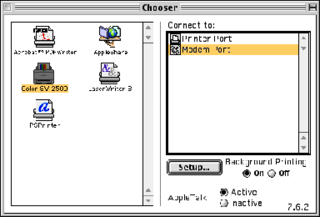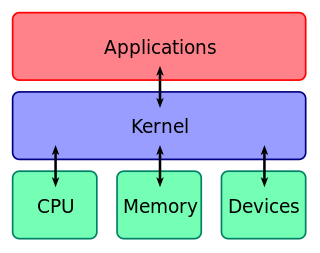
A sound card is an internal expansion card that provides input and output of audio signals to and from a computer under the control of computer programs. The term sound card is also applied to external audio interfaces used for professional audio applications.

In computer architecture, 64-bit integers, memory addresses, or other data units are those that are 64 bits wide. Also, 64-bit central processing units (CPU) and arithmetic logic units (ALU) are those that are based on processor registers, address buses, or data buses of that size. A computer that uses such a processor is a 64-bit computer.

Mac OS 9 is the ninth and final major release of Apple's classic Mac OS operating system, which was succeeded by Mac OS X 10.0 in 2001, starting the Mac OS X family of operating systems. Introduced on October 23, 1999, it was promoted by Apple as "The Best Internet Operating System Ever", highlighting Sherlock 2’s Internet search capabilities, integration with Apple's free online services known as iTools and improved Open Transport networking. While Mac OS 9 lacks protected memory and full pre-emptive multitasking, lasting improvements include the introduction of an automated Software Update engine and support for multiple users.

Virtual Studio Technology (VST) is an audio plug-in software interface that integrates software synthesizers and effects units into digital audio workstations. VST and similar technologies use digital signal processing to simulate traditional recording studio hardware in software. Thousands of plugins exist, both commercial and freeware, and many audio applications support VST under license from its creator, Steinberg.

GarageBand is a software application by Apple for macOS, iPadOS, and iOS devices that allows users to create music or podcasts. It is a lighter, amateur-oriented offshoot of Logic Pro. GarageBand was originally released for macOS in 2004 and brought to iOS in 2011. The app's music and podcast creation system enables users to create multiple tracks with software synthesizer presets, pre-made and user-created loops, an array of various effects, and voice recordings.

XNU is the computer operating system (OS) kernel developed at Apple Inc. since December 1996 for use in the Mac OS X operating system and released as free and open-source software as part of the Darwin OS, which, in addition to being the basis for macOS, is also the basis for Apple TV Software, iOS, iPadOS, watchOS, visionOS, and tvOS.
Installation of a computer program, is the act of making the program ready for execution. Installation refers to the particular configuration of software or hardware with a view to making it usable with the computer. A soft or digital copy of the piece of software (program) is needed to install it. There are different processes of installing a piece of software (program). Because the process varies for each program and each computer, programs often come with an installer, a specialised program responsible for doing whatever is needed for the installation. Installation may be part of a larger software deployment process.

The Chooser is an application program for Macintosh systems using the classic Mac OS. The Chooser started out as a desk accessory and became a standalone application program as of System 7. The Chooser allowed users to connect to AppleShare file servers, enable or disable the network access, and select which printer to use.
Digital Performer is a digital audio workstation and music sequencer software package published by Mark of the Unicorn (MOTU) of Cambridge, Massachusetts for the Apple Macintosh and Microsoft Windows platforms.
ReWire is a software protocol, jointly developed by Propellerhead and Steinberg, allowing remote control and data transfer among digital audio editing and related software. Originally appearing in the ReBirth software synthesizer in 1998, the protocol has since evolved into an industry standard.

The Apple Remote is a remote control introduced in October 2005 by Apple Inc. for use with a number of its products with infrared capability. It was originally designed to control the Front Row media center program on the iMac G5 and is compatible with many subsequent Macintosh computers. The first three generations of Apple TV used the Apple Remote as their primary control mechanism. It has now been replaced with the Siri Remote in the fourth generation. Prior to the Apple Remote, Apple produced several nameless IR remotes for products such as the Macintosh TV, TV tuner expansion boards, and the PowerCD drive.
Open Music System (OMS) was a virtual studio management application by Opcode for the Classic Mac OS. Similar to FreeMIDI by Mark of the Unicorn and Audio MIDI Setup by Apple, OMS used a GUI to manage MIDI devices by providing DAW applications and the Mac OS with information regarding the physical setup of MIDI devices connected to the computer.
Operating system Wi-Fi support is defined as the facilities an operating system may include for Wi-Fi networking. It usually consists of two pieces of software: device drivers, and applications for configuration and management.
Binary-code compatibility is a property of a computer system, meaning that it can run the same executable code, typically machine code for a general-purpose computer central processing unit (CPU), that another computer system can run. Source-code compatibility, on the other hand, means that recompilation or interpretation is necessary before the program can be run on the compatible system.
Commodore Amiga MIDI Driver (CAMD) is a shared library for AmigaOS which provides a general device driver for MIDI data, so that applications can share MIDI data with each other in real-time, and interface to MIDI hardware in a device-independent way.

AmigaOS is a family of proprietary native operating systems of the Amiga and AmigaOne personal computers. It was developed first by Commodore International and introduced with the launch of the first Amiga, the Amiga 1000, in 1985. Early versions of AmigaOS required the Motorola 68000 series of 16-bit and 32-bit microprocessors. Later versions, after Commodore's demise, were developed by Haage & Partner and then Hyperion Entertainment. A PowerPC microprocessor is required for the most recent release, AmigaOS 4.

The kernel is a computer program at the core of a computer's operating system and generally has complete control over everything in the system. The kernel is also responsible for preventing and mitigating conflicts between different processes. It is the portion of the operating system code that is always resident in memory and facilitates interactions between hardware and software components. A full kernel controls all hardware resources via device drivers, arbitrates conflicts between processes concerning such resources, and optimizes the utilization of common resources e.g. CPU & cache usage, file systems, and network sockets. On most systems, the kernel is one of the first programs loaded on startup. It handles the rest of startup as well as memory, peripherals, and input/output (I/O) requests from software, translating them into data-processing instructions for the central processing unit.
RTP-MIDI is a protocol to transport MIDI messages within Real-time Transport Protocol (RTP) packets over Ethernet and WiFi networks. It is completely open and free, and is compatible both with LAN and WAN application fields. Compared to MIDI 1.0, RTP-MIDI includes new features like session management, device synchronization and detection of lost packets, with automatic regeneration of lost data. RTP-MIDI is compatible with real-time applications, and supports sample-accurate synchronization for each MIDI message.

Mac OS is the series of operating systems developed for the Macintosh family of personal computers by Apple Computer, Inc. from 1984 to 2001, starting with System 1 and ending with Mac OS 9. The Macintosh operating system is credited with having popularized the graphical user interface concept. It was included with every Macintosh that was sold during the era in which it was developed, and many updates to the system software were done in conjunction with the introduction of new Macintosh systems.










